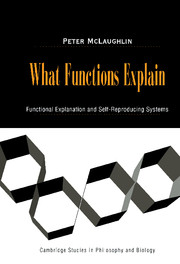PART II - THE ANALYSIS OF FUNCTIONAL EXPLANATION
Published online by Cambridge University Press: 12 August 2009
Summary
Sometimes the most important step toward analyzing a problem in philosophy of science is to get clear on just what the difference was between the solutions offered by C. G. Hempel and Ernest Nagel on the point at issue. This is certainly the case for the question of functional explanation, where the same two basic alternatives have been debated back and forth over the past forty years in the philosophy of science literature. The point at issue is the proper interpretation of function ascription statements insofar as these are taken to be explanatory. At stake is the question whether such function ascriptions have a legitimate place in the natural or social sciences, that is, whether they can be reformulated without seeming to appeal to final causality. Neither Hempel nor Nagel is particularly interested in the functions of artifacts (which are not adduced in scientific explanations), nor do they actively seek a general theory of function ascription or functional language that applies to both artificial and natural functions in all cases. In fact, the analysis Hempel provides is not applicable to most artifactual functions, and the analysis of Nagel would have to be stretched quite a bit to accommodate artifacts that are not very complex. Both are interested primarily in examining the nature of a kind of scientific explanation they have encountered in both the biological and the social sciences.
- Type
- Chapter
- Information
- What Functions ExplainFunctional Explanation and Self-Reproducing Systems, pp. 63 - 64Publisher: Cambridge University PressPrint publication year: 2000



